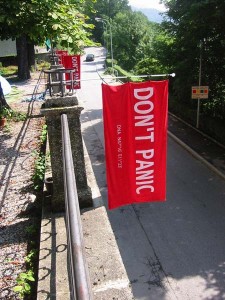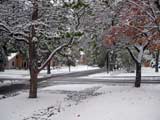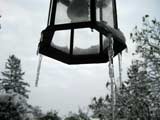Imagine yourself doing something you do pretty much every day. You could be on a trip to the grocery store, or seeing a movie, or eating in a cafeteria. Maybe you’re just walking down the street. Now imagine that you start to feel pressure in your chest, so subtly at first that you don’t notice any onset; after a while it’s just there, and it’s growing. For me, it always starts in the chest. It feels like my lungs are a little bit too small but heavier than normal. “Maybe,” you start to think, “this feeling will go away by itself.” Maybe if you stop thinking about it. But it doesn’t. You can’t stop thinking about it. Quite the opposite in fact — the crushing feeling intensifies and it’s the only thing you can think about. Every breath you take feels shorter than the last, like an invisible boa constrictor is slowly squeezing the normalcy out of you. Breathe out the sanity and mundanity of what you’re doing; breathe in panic, breath by terrifying breath.
Now you start to become acutely aware of how others perceive you. Your breathing becomes shallower and shallower, which must be more and more noticeable to the people around you, which only intensifies your fear and worsens your breathing. It’s a vicious circle that robs you of all clarity. You keep looking from side to side, almost as if you’re expecting to be attacked, as if this horror inside your brain could be made manifest. Your thoughts start bouncing around in your head, all the while orbiting a central nexus of fear and doubt and, well… panic. Each moment brings your thoughts closer and closer to the central black hole about which all your thoughts are swirling. Anything. You’d give anything to escape, to get out, to leave now. By now you’re breathing faster and harder and heavier than you ever do when you’re exercising and exhausted. You feel like shouting, you feel like exploding, you feel like you’re going to die, and being aware of it all makes it so much worse. There is nothing you can do. You feel so stupid and small; you can’t believe you actually thought you had a chance to stop this. So you get out, any way you can. You lie, you run, you flee. And next time you’re facing a similar situation, you might find an excuse to avoid it entirely, because who would want to ever experience that more than once?
This is the best I can do to describe a panic attack. If you’ve never experienced it, you will never be able to understand fully. And you are very, very fortunate.
I remember my first panic attack well. It was in seventh grade, on a field trip, on a bus. It was triggered by my fear of heights. We were coming down from some precipice in Montana (there are a lot of them there), on a trip to Helena or Butte or one of the other major cities. I remember looking out the window and feeling certain that we were going to plunge off the edge. I remember telling myself how stupid that was, and simultaneously not believing a word of it. And I remember my breath starting to get faster and faster, and thinking about how my classmates must be aware of it, and how that made it even worse. And then we were down, and the danger was gone, but the fear wasn’t. I cried into my jacket, and after fifteen minutes or so I could look up. It was horrible, but I had a good friend with me (Josh) who comforted me. That was nice. It’s one of the best things to get you through it. These days, it’s Carrie who gets me through it.
The worst part about panic attacks is that you can never tell they’re going to come until they start. You can’t predict them. You can identify circumstances that increase the chances that one will strike, but there are no guarantees. You could go to the same place at the same time of day with the same circumstances, and one day you’ll be fine and the other day everything will just implode. My attacks hit the hardest during my freshman year of college. I wasn’t really close friends with anybody in my grade who was also attending the University of Montana (most of my friends were in the grade below), and I’m pretty awkward about making friends, so I was very, very alone my first year. Thus, I didn’t have anybody to help me through the attacks, which made them a million times worse.
I also had the cheapest meal plan. So I could only eat once a day, in the cafeteria (called appropriately enough, the Food Zoo), by myself. I always ate dinner there, usually a huge meal because I was so hungry by that time of day. Some days, I was fine. I could go there, eat my fill, and return to my room, to watch Jeopardy and the news. Other days, I could barely make it to my table and eat a few bites before I had to escape. Sometimes, I wouldn’t even finish getting my food because I knew I wouldn’t even be able to start eating. During the mildest of attacks, I could eat enough food to meet my biological needs and could even feel relaxed enough (this is a relative term) to leave my tray in the food disposal area. During the worst attacks, I just left everything where it was. I think this happened at least twice. Sorry, fellow Food Zoo patrons and Food Zoo workers. There really wasn’t anybody sitting there.
That’s probably why I got so thin my first year of school. I wasn’t eating that much to begin with, and every once in a while (probably once a week during the worst stretch) I would just skip a meal. One week, there was a three-day stretch when I didn’t eat anything because I couldn’t force myself to because I was so afraid of another attack. This is a key component of Panic Attacks — avoiding the circumstances that trigger them. The second day of that fun stretch, I just left my tray on the buffet line, and ran out the door, and hid behind the bushes trying to catch my breath and stop crying. Probably looked pretty interesting, this big guy breathing hard and crouching in the bushes planted outside the first floor of a dorm. This was about the time I started taking advantage of the free counseling that they offered at the Curry Health Center. It wasn’t just about the panic attacks, I was also working through my awkwardness and shyness. It helped a lot. I cannot stress that enough. Professionals know how to help. Later, I was helped more by having friends nearby. The attacks diminished my second year, and by my last year of school (year six, for those keeping track), I was free of them as a recurring ordeal.
The strangest thing is that I don’t mind being in a crowd if they’re watching me perform. I was in Speech and Debate in high school, and never had a performance-related attack — even at the state meet. I never felt that way in any of the plays I was in, or before or during any of my bands’ shows. The most terrifying attacks are triggered by crowds, but not by audiences. If they’re watching something, even me, then I have no reason to be afraid. That doesn’t make sense, but neither do panic attacks, really.
Large crowds are the only significant trigger I have now. I still get an attack every now and then. Like I said, I can’t predict it. I’ve been fortunate enough not to have one happen in the cafeteria at work, or on the bus, or at a Mariners game or Rat City Roller Girls game. The last one was at the Pacific Science Center, when Carrie and I and some other friends were seeing the Star Wars exhibit. I hadn’t even gotten through the first floor when I knew it was coming. It came on fast, and I had to leave. I was so upset, I didn’t even look at the gift shop. I spent the next 20 minutes sitting on the cement walkway outside the gift shop, slowing my breathing and wondering what the rest of the exhibit was like. By then I’d calmed down enough that I didn’t even look distraught.
It’s gotten really good. The Star Wars episode was the last significant attack I’ve had (I had a minor one while walking to work a couple Fridays ago, but it wasn’t nearly as major as it might have been). I did worry that something might happen when Carrie and I went up the Space Needle, but that was fine, too. All in all, I’m getting better. This has a redoubling effect, because it means I think about the attacks less, which means I worry less, which means I have them less. I wish I could logic myself into this kind of scenario, but it only happens with time and a little luck.
I don’t really tell many people about my panic attacks, because I guess I’m ashamed of them. I’ve written a song or two about it, but in vague enough terms that it probably wasn’t clear unless you were really paying attention. The only people who know for sure are probably Carrie and my parents. I’m trying to change this because I’m trying to fight off the last lingering traces. It’s absolutely terrifying having a panic attack, but having people who care about you enough to help you through it is as close to a cure as there is for me.
Here’s one of those songs I told you about: The Suckers — “A Normal Life”


 Full-Size (3264×2448)
Full-Size (3264×2448)

 Updates via
Updates via 